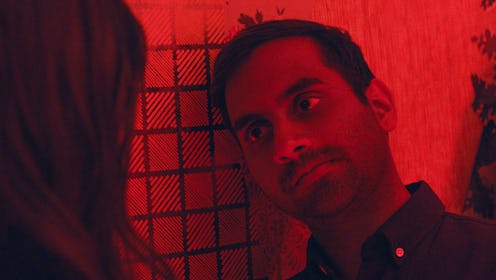
One of my favorite things about Master Of None is Aziz Ansari's ability to break down the questions of our time and make them digestible, posited in little half hour increments. Season 2, Episode 3 of Master Of None tackles religion. Is Aziz Ansari Muslim outside of Master Of None, though? This particular episode shows that religious identity not as simple as everyone thinks (ha).
We open with Dev and his father meeting his aunt, uncle, and cousin, Navid, and his father telling Dev to greet them with the traditional “assalamualaikum” greeting, because Dev's uncle is very pious and loves his Muslim identity. Dev's parents are religious but less so — they're the type to go to mosque on holidays, kind of like how my parents shrugged and brought me to church occasionally on Easter. Dev pretends to be the pious praying Muslim that he is certainly not, and everything is fine until later that weekend, Dev introduces Navid to the wonderful food that is pork (followers of Islam do not typically eat pork due to religious tenets). This all seems pretty true to life for the real Ansari, whose parents are Muslim. But he has been outspoken about how he's not religious and he does eat pork, unlike his parents.
On the show, during a pork bender, Navid insists that he and Dev skip prayers for Eid the next day to go to a barbecue festival. They of course cannot tell their parents, but they have a good time, even if they did lie and tell their parents that they had food poisoning in order to go to the festival. At their last dinner with the family, Dev says, "to hell with it," and he orders a crispy pork dish that sends his mother over the edge. She is angry. She doesn't know why her son is flaunting this in front of her, and when his parents confront him later, Dev tells them that he is grown and can make his own religious determinations about which tenets he wants to follow.
After not talking for a few weeks (and through some gentle pushing by his father), Dev cracks the Koran that he has never opened and reaches and understanding with his own religious self.
Many of Dev's friends in the series were raised in religion like I was or like he was — it was a framework of the rules to be a good person, but not something you necessarily did every day. And Dev's friends make great points in his quest to understand whether or not he should tell his parents that he's not the nice Muslim boy they thought but instead loves a good porchetta sandwich (me too, Dev, me too). The refrain was about compromise. Honor the parts of religion that your parents honor, if only when you're in their presence, and make your own devotion work in whatever way you want it to for your individuality.
There's no easy answer here. In the modern world, religion is not one size fits all. It is open to interpretation, even bad interpretation, as Dev's mother says when he questions how some Muslims treat women. For Dev, his Islam identity is at odds with his New Yorker millennial identity, and eventually, the two seem to find some peace together.
Editor's Note: On Jan. 13, Ansari was accused of sexual misconduct by a woman who went on a date with him. Ansari has since responded to the claims, saying:
"In September of last year, I met a woman at a party. We exchanged numbers. We texted back and forth and eventually went on a date. We went out to dinner, and afterwards we ended up engaging in sexual activity, which by all indications was completely consensual.
The next day, I got a text from her saying that although 'it may have seemed okay,' upon further reflection, she felt uncomfortable. It was true that everything did seem okay to me, so when I heard that it was not the case for her, I was surprised and concerned. I took her words to heart and responded privately after taking the time to process what she had said.
I continue to support the movement that is happening in our culture. It is necessary and long overdue."